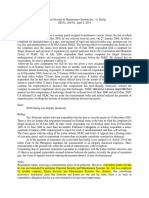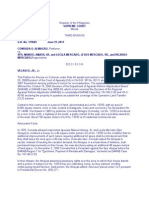Navarro V Escobido
Navarro V Escobido
Uploaded by
Alleine TupazCopyright:
Available Formats
Navarro V Escobido
Navarro V Escobido
Uploaded by
Alleine TupazOriginal Title
Copyright
Available Formats
Share this document
Did you find this document useful?
Is this content inappropriate?
Copyright:
Available Formats
Navarro V Escobido
Navarro V Escobido
Uploaded by
Alleine TupazCopyright:
Available Formats
Navarro v.
Escobido
FACTS:
Private Respondent Karen Go (wife of Glen Go) of Karago Enterprises (buying/selling of motor vehicles), filed 2
complaints before the RTC for replevin and/or sum of money with damages against Petitioner Navarro.
1st cause of action- Navarro leased from Karen Go a motor vehicle (Fuso with mounted crane) under a “Lease
Agreement with Option to Purchase” on August 8, 1997. Navarro delivered 6 post-dated checks (P66,333.33 each),
however, the 5th and 6th checks ( amounting to P132,666.66) being dishonored. Plaintiff demanded payment of the
principal liability or to return the motor vehicle.
2nd cause of action- similar to the first complaint except that the lease agreement with option to purchase was dated
October 1, 1997 and involves motor vehicle with a different serial and motor number. Navarro delivered 3 post-dated
checks (P100,000 each) to Karen Go, 3rd check was dishonored.
On October 12, 1998 and October 14, 1998, the RTC issued writs of replevin for both cases; as a result, the Sheriff
seized the two vehicles and delivered them to the possession of Karen Go.
In his answer, Navarro alleged that the 2 complaints has no cause of action since Karen Go was not a party to the
lease agreements.
RTC dismissed the case due to the lack of cause of action but reversed it in another order ruling that the leasing
business is a conjugal property of the spouses. It is also ordered the inclusion of Glen Go as a co-plaintiff.
CA affirmed RTC order.
ISSUE:
WON the case lacks a cause of action since Karen Go was not a party to the lease agreements.
HELD:
No. Karen Go is the real party-in-interest. As the registered owner of Kargo Enterprises, Karen Go is the party who
will directly benefit from or be injured by a judgment in this case.
Kargo Enterprises is a sole proprietorship, which is neither a natural person, nor a juridical person, as defined by
Article 44 of the Civil Code. Hence it cannot be a party to a civil action. Thus, contrary to Navarro's contention, Karen
Go is the real party-in-interest being a registered owner, and it is legally incorrect to say that her Complaint does not
state a cause of action because her name did not appear in the Lease Agreement.
Kargo Enterprises is a conjugal property. Article 124 of the Family Code, allows either Karen or Glenn Go to speak
and act with authority in managing their conjugal property. No need exists for one of them to obtain the consent of the
other before performing an act of administration or any act that does not dispose of or encumber their conjugal
property.
Article 108 of the FC further provides that conjugal partnership is governed by rules on the contract of partnership. In
the case at bar, Article 1811 of the CC is applicable which stipulates that a partner as a co-owner has an equal right
with his partners to possess specific partnership property. Since Glenn and Karen Go are effectively co-owners of
Kargo Enterprises and the properties registered under this name, both have an equal right to seek possession of
these properties.
Moreover, Article 487 of the Civil Code that allows any of the co-owners to bring an action in ejectment with respect
to the co-owned property. Any one of them may bring an action, any kind of action, for the recovery of co-owned
properties. In this case, only one of the co-owners, namely the co-owner who filed the suit for the recovery of the co-
owned property, is an indispensable party thereto. Hence, either of the spouses Go may bring an action against
Navarro to recover possession of the Kargo Enterprises-leased vehicles which they co-own.
Since Glenn Go is not strictly an indispensable party in the action to recover possession of the leased vehicles, he
only needs to be impleaded as a pro-forma party to the suit. Misjoinder or non-joinder of indispensable parties in a
complaint is not a ground for dismissal of action. The RTC Order requiring plaintiff Karen Go to join her husband as a
party plaintiff is fully in order.
You might also like
- Answer To Ejectment ComplaintDocument4 pagesAnswer To Ejectment ComplaintKayelyn Lat75% (4)
- Garcia vs. PALDocument1 pageGarcia vs. PALJulius Geoffrey TangonanNo ratings yet
- Tan v. GumbaDocument5 pagesTan v. GumbaBenedict Jonathan BermudezNo ratings yet
- CORP Finals 9.5 16 PDFDocument270 pagesCORP Finals 9.5 16 PDFAlleine TupazNo ratings yet
- IAB Annual Accountability Report 2018-2019Document37 pagesIAB Annual Accountability Report 2018-2019FOX5 VegasNo ratings yet
- Zunio Vs CabredoDocument3 pagesZunio Vs CabredoMaria Jela MoranNo ratings yet
- Sameer Overseas Placement Agency VsDocument2 pagesSameer Overseas Placement Agency VsBikoy EstoqueNo ratings yet
- Bernardo VS CaDocument2 pagesBernardo VS CaRamon Khalil Erum IVNo ratings yet
- CBADocument10 pagesCBAGillian Caye Geniza BrionesNo ratings yet
- 125383-1997-Juco v. NLRC PDFDocument6 pages125383-1997-Juco v. NLRC PDFKrizel BianoNo ratings yet
- Morfe V Justice of Peace of CaloocanDocument1 pageMorfe V Justice of Peace of CaloocansideshowjowellaNo ratings yet
- Class Advisory No. 8 (02 May 2021)Document2 pagesClass Advisory No. 8 (02 May 2021)Karl Lorenzo BabianoNo ratings yet
- CD - 91. Zuo v. CabredoDocument2 pagesCD - 91. Zuo v. CabredoCzarina Cid100% (1)
- Emeritus Security & Maintenance Systems Inc., vs. DailigDocument2 pagesEmeritus Security & Maintenance Systems Inc., vs. DailigNej AdunayNo ratings yet
- Alabang Country Club, Et Al. V. National Labor RELATIONS COMMISSION, Et Al. 466 SCRA 329 (2005), THIRD DIVISION, (Carpio Morales, J.)Document1 pageAlabang Country Club, Et Al. V. National Labor RELATIONS COMMISSION, Et Al. 466 SCRA 329 (2005), THIRD DIVISION, (Carpio Morales, J.)piptipaybNo ratings yet
- Taningco v. Fernandez, Gr. No. 215615, December 9,2020Document3 pagesTaningco v. Fernandez, Gr. No. 215615, December 9,2020Jemielle Patriece Narcida100% (1)
- Rosario E. Cahambing, vs. Victor Espinosa and Juana AngDocument13 pagesRosario E. Cahambing, vs. Victor Espinosa and Juana AngLizaNo ratings yet
- Legal Ethics Canon 3 Section 2Document11 pagesLegal Ethics Canon 3 Section 2Axel GonzalezNo ratings yet
- SEC v. Interport Resources CorporationDocument3 pagesSEC v. Interport Resources CorporationCourtney TirolNo ratings yet
- Judicial Ethics Case DigestDocument10 pagesJudicial Ethics Case Digestdot_rocksNo ratings yet
- Petitioner vs. vs. Respondent: en BancDocument4 pagesPetitioner vs. vs. Respondent: en BancFrances Angelica Domini KoNo ratings yet
- Statutory Construction CasesDocument17 pagesStatutory Construction CasesJaveelyn MataroNo ratings yet
- Almagro Vs Sps AmayaDocument15 pagesAlmagro Vs Sps AmayabrigetteNo ratings yet
- Purisima, J.: Firestone Ceramics Petitioners vs. Court of AppealsDocument3 pagesPurisima, J.: Firestone Ceramics Petitioners vs. Court of Appeals.No ratings yet
- 10-Spouses Soller v. Singson20220404-13-1bctkffDocument5 pages10-Spouses Soller v. Singson20220404-13-1bctkffBernadith RectoNo ratings yet
- Central Visayas Finance Corp Vs Spouses AdlawanDocument3 pagesCentral Visayas Finance Corp Vs Spouses AdlawanJhude RavilasNo ratings yet
- Labor Relations Case Digests FINALSDocument210 pagesLabor Relations Case Digests FINALSJoan DolienteNo ratings yet
- 25 - AASJS Vs DatumanongDocument2 pages25 - AASJS Vs DatumanongPatrick ManaloNo ratings yet
- Sunace V NLRCDocument11 pagesSunace V NLRCReihannah Paguital-MagnoNo ratings yet
- Andres V MantrustDocument4 pagesAndres V MantrustJenny LoNo ratings yet
- PHILIPPINE DUPLICATORS, INC. vs. NLRC PDFDocument1 pagePHILIPPINE DUPLICATORS, INC. vs. NLRC PDFAngela De LeonNo ratings yet
- Smith Kline Case DigestDocument3 pagesSmith Kline Case DigestShie La Ma RieNo ratings yet
- Militante Vs NLRCDocument1 pageMilitante Vs NLRCjohnmiggyNo ratings yet
- Specpro CasesDocument4 pagesSpecpro Casesjamilove20No ratings yet
- G.R. No. 146989 February 7, 2007 MELENCIO GABRIEL, Represented by Surviving Spouse, FLORDELIZA V. GABRIELDocument2 pagesG.R. No. 146989 February 7, 2007 MELENCIO GABRIEL, Represented by Surviving Spouse, FLORDELIZA V. GABRIELKath LimNo ratings yet
- Petitioners Vs Vs Respondent: en BancDocument7 pagesPetitioners Vs Vs Respondent: en BancChiic-chiic Salamida0% (1)
- University of San Agustin Employees Union Vs Court of Appeals 2006 Case DigestDocument2 pagesUniversity of San Agustin Employees Union Vs Court of Appeals 2006 Case DigestDino Bernard LapitanNo ratings yet
- Possible Complete Digest of LaborDocument111 pagesPossible Complete Digest of LaborTenshi OideNo ratings yet
- SIY v. TOMLIN-WPS OfficeDocument1 pageSIY v. TOMLIN-WPS OfficeRafael Francesco GonzalesNo ratings yet
- Heavylift Manila Vs Court of AppealsDocument2 pagesHeavylift Manila Vs Court of AppealsCuddlyNo ratings yet
- 20-St. Lukes v. SanchezDocument2 pages20-St. Lukes v. SanchezHanna BesaNo ratings yet
- San Juan Vs CSCDocument2 pagesSan Juan Vs CSCPio MathayNo ratings yet
- Norma Mabeza, Petitioner, vs. National Labor Relations Commission, PETER NG/HOTEL SUPREME, Respondents. G.R. No. 118506. April 18, 1997Document1 pageNorma Mabeza, Petitioner, vs. National Labor Relations Commission, PETER NG/HOTEL SUPREME, Respondents. G.R. No. 118506. April 18, 1997Mae Clare BendoNo ratings yet
- Last Minute Tips For Remedial Law Review FinalsDocument2 pagesLast Minute Tips For Remedial Law Review Finalsmercy rodriguezNo ratings yet
- St. Martin Funeral Home Vs NLRCDocument1 pageSt. Martin Funeral Home Vs NLRCbidanNo ratings yet
- Manila Terminal Co V CIRDocument2 pagesManila Terminal Co V CIRMiguel Joshua Gange AguirreNo ratings yet
- Digest Sameer Overseas Placement Agency vs. CabilesDocument2 pagesDigest Sameer Overseas Placement Agency vs. CabilesrheaNo ratings yet
- 25.tan vs. Lagrama, G.R. No. 151228 Aug. 15, 2002Document11 pages25.tan vs. Lagrama, G.R. No. 151228 Aug. 15, 2002MykaNo ratings yet
- Fortun V QuinsayasDocument2 pagesFortun V QuinsayasAmanda ButtkissNo ratings yet
- Case No. 6 DigestDocument2 pagesCase No. 6 DigestNardz Andanan100% (1)
- Eileen David vs. Glenda MarquezDocument2 pagesEileen David vs. Glenda MarquezAreeya ManalastasNo ratings yet
- Dumpit-Murillo vs. CADocument2 pagesDumpit-Murillo vs. CABert NazarioNo ratings yet
- Banco Filipino Savings and Mortgage BankDocument2 pagesBanco Filipino Savings and Mortgage BankYani RamosNo ratings yet
- Case Digests-1Document29 pagesCase Digests-1Ianna Carmel QuitayenNo ratings yet
- Gsis Vs CA DigestDocument2 pagesGsis Vs CA DigestJonathan Dela CruzNo ratings yet
- Manila Jockey Club v. TrajanoDocument2 pagesManila Jockey Club v. TrajanoAnonymous wbEpfdMNo ratings yet
- ABS CBN Vs MarquezDocument5 pagesABS CBN Vs MarquezIan BinoyaNo ratings yet
- Medenilla vs. Phil Veterans BankDocument2 pagesMedenilla vs. Phil Veterans BankBalaod MaricorNo ratings yet
- Villaruel vs. Yeo Han GuanDocument3 pagesVillaruel vs. Yeo Han GuanZach Matthew GalendezNo ratings yet
- Romeo P. Busuego, Catalino F. Banez and Renato F. Lim, Petitioners, vs. The Honorable Court of Appeals and The Monetary Board of The CentralDocument1 pageRomeo P. Busuego, Catalino F. Banez and Renato F. Lim, Petitioners, vs. The Honorable Court of Appeals and The Monetary Board of The CentralchaNo ratings yet
- Bar Exam 2018 Labor Law: Suggested AnswerDocument14 pagesBar Exam 2018 Labor Law: Suggested AnswerJANE MARIE DOROMALNo ratings yet
- Navarro vs. EscobidoDocument2 pagesNavarro vs. EscobidoprincessF0717No ratings yet
- Brion, J.:: Roger V. Navarro vs. Hon. Jose L. EscobidoDocument3 pagesBrion, J.:: Roger V. Navarro vs. Hon. Jose L. EscobidoJanine CastroNo ratings yet
- People v. Judge AysonDocument8 pagesPeople v. Judge AysonAlleine TupazNo ratings yet
- People V Ayson DigestDocument2 pagesPeople V Ayson DigestAlleine Tupaz100% (1)
- Case Digest FormatDocument1 pageCase Digest FormatAlleine TupazNo ratings yet
- Missy Fate Rodriguez Toledo PDFDocument1 pageMissy Fate Rodriguez Toledo PDFAlleine TupazNo ratings yet
- Cmu vs. DarDocument2 pagesCmu vs. DarAlleine TupazNo ratings yet
- Comilang v. BurcenaDocument4 pagesComilang v. BurcenaAlleine TupazNo ratings yet
- New Message - Receipt and Confirmation: Current Client TFN ABNDocument1 pageNew Message - Receipt and Confirmation: Current Client TFN ABNAlleine TupazNo ratings yet
- TheftDocument1 pageTheftAlleine TupazNo ratings yet
- CPSPL Board Resolution FormatDocument1 pageCPSPL Board Resolution FormatAlleine Tupaz100% (1)
- Arlin Obiasca VsDocument1 pageArlin Obiasca VsAlleine TupazNo ratings yet
- Warehouse CompaniesDocument4 pagesWarehouse CompaniesAlleine TupazNo ratings yet
- Testate Estate of Mota V SerraDocument3 pagesTestate Estate of Mota V SerraAlleine TupazNo ratings yet
- The Patriot and The EliteDocument4 pagesThe Patriot and The EliteAlleine TupazNo ratings yet
- Court) Whereby It Was Agreed That Said Creditors Would Receive 20% of The Amount ofDocument2 pagesCourt) Whereby It Was Agreed That Said Creditors Would Receive 20% of The Amount ofAlleine TupazNo ratings yet
- Tatad vs. SecDocument51 pagesTatad vs. SecAlleine TupazNo ratings yet
- Doc. No.: - Page No.: - Book No.: - Notary Public Series of 2018Document1 pageDoc. No.: - Page No.: - Book No.: - Notary Public Series of 2018Alleine TupazNo ratings yet
- Paul Smith V Jefferson Parish, John Young, Et Al: ComplaintDocument18 pagesPaul Smith V Jefferson Parish, John Young, Et Al: ComplaintnowdoucitNo ratings yet
- Z Produx v. TKB Trading - ComplaintDocument8 pagesZ Produx v. TKB Trading - ComplaintSarah BursteinNo ratings yet
- Paflu Vs Salas GR L-39084Document2 pagesPaflu Vs Salas GR L-39084Breth1979No ratings yet
- PAL Employees Loans Savings Inc V NLRCDocument15 pagesPAL Employees Loans Savings Inc V NLRCphilip_galeon100% (1)
- People v. FerrerDocument2 pagesPeople v. FerrerRukmini Dasi Rosemary GuevaraNo ratings yet
- JAT Wheels v. DB Motoring - Request For Default JudgmentDocument36 pagesJAT Wheels v. DB Motoring - Request For Default JudgmentSarah BursteinNo ratings yet
- Villanueva V PeopleDocument1 pageVillanueva V PeopleAnonymous bOncqbp8yiNo ratings yet
- Laconsay v. Berog y CaraosDocument2 pagesLaconsay v. Berog y CaraosMaria AnalynNo ratings yet
- Taylor v. Family Residences & Essential Enterprises, Inc. (Free) - Document No. 76Document10 pagesTaylor v. Family Residences & Essential Enterprises, Inc. (Free) - Document No. 76Justia.comNo ratings yet
- Alluvion - Property CasesDocument10 pagesAlluvion - Property CasesChris JavierNo ratings yet
- Application Submitted For: Oxford Manor: Basic InformationDocument14 pagesApplication Submitted For: Oxford Manor: Basic InformationHa shtNo ratings yet
- Title IVDocument13 pagesTitle IVAriel Maghirang100% (1)
- Ryanair vs. ExpediaDocument14 pagesRyanair vs. ExpediaGeekWireNo ratings yet
- Republic of The Philippines, Petitioner, vs. Court of Appeals and CYNTHIA VICENCIO, RespondentsDocument45 pagesRepublic of The Philippines, Petitioner, vs. Court of Appeals and CYNTHIA VICENCIO, RespondentsmhadzNo ratings yet
- FRANCISCO A. LABAO v. LOLITO N. FLORESDocument2 pagesFRANCISCO A. LABAO v. LOLITO N. FLORESMark Dennis AsuncionNo ratings yet
- Legal RedemptionDocument8 pagesLegal RedemptionGenard Neil Credo Barrios100% (1)
- Vda de Pama Vs Pama 124 SCRA 377, ReportDocument4 pagesVda de Pama Vs Pama 124 SCRA 377, ReportAtty Ed Gibson BelarminoNo ratings yet
- S & A Capital Partners V American Bank 2017-018899-CA-01, 11th Cir FL Miami-Dade County FinalDocument4 pagesS & A Capital Partners V American Bank 2017-018899-CA-01, 11th Cir FL Miami-Dade County Finallschneider68No ratings yet
- Midterm Labor Relations CasesDocument218 pagesMidterm Labor Relations CasesSid Sid100% (1)
- Deshaun Watson LawsuitDocument9 pagesDeshaun Watson LawsuitHouston ChronicleNo ratings yet
- Reyes V DoctoleroDocument1 pageReyes V DoctoleroAllen Windel BernabeNo ratings yet
- My Notes For July 8 2019Document69 pagesMy Notes For July 8 2019Yannah HidalgoNo ratings yet
- Philippine American Life & General Insurance Vs Breva To Greenstar Vs NissinDocument15 pagesPhilippine American Life & General Insurance Vs Breva To Greenstar Vs Nissinana ortizNo ratings yet
- G.R. No. 179799. September 11, 2009.Document15 pagesG.R. No. 179799. September 11, 2009.JM DzoNo ratings yet
- DOJ DC 38s of 2012 PDFDocument7 pagesDOJ DC 38s of 2012 PDFSammy EscañoNo ratings yet
- DOJ V MislangDocument14 pagesDOJ V MislangHannah SyNo ratings yet
- Cuaycong V CuaycongDocument36 pagesCuaycong V CuaycongJepz FlojoNo ratings yet
- Writ of Mandamus On Commissioner of Police, Mumbai - Save Indian Family FoundationDocument21 pagesWrit of Mandamus On Commissioner of Police, Mumbai - Save Indian Family FoundationkaminiNo ratings yet










































































































